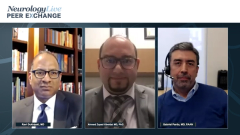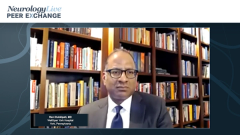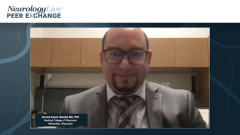
Switching DMTs in Patients With RRMS
Ahmed Zayed Obeidat MD, PhD; Ravi Dukkipati, MD; and Gabriel Pardo, MD, FAAN, discuss a patient case with relapsing/remitting multiple sclerosis progression and share considerations for switching treatment.
Episodes in this series

Ahmed Zayed Obeidat, MD, PhD: Some of the other components that will come up now that you’re switching to a different agent are: do you wash out the other medication? Do you wait? Do you start right away? This is a big question that comes to mind. Sometimes it depends on the DMT [disease-modifying therapy] itself. Dr Pardo, do you wash out in this patient?
Gabriel Pardo, MD, FAAN: That’s the big topic of sequencing, whether we want to or not. Even if we start a highly efficacious medication, we might face a situation where we need to transfer that patient to a different medication. It can be for safety reasons; it might not be efficacy. It can be tolerability issues. It can be insurance coverage. Then we’re in a situation where we need to transition the patient from 1 medication to another. It’s not an easy decision all the time. Sometimes it’s very straightforward, and we don’t need to do any washout and we can move on with the new agent. It all depends on which DMT we’re using at the time, the risks implied in discontinuing, and the risks implied in overlapping the potential immunosuppressive effects of 2 different agents. How I’m going to approach that depends on each DMT.
There are also other characteristics that come into consideration—for example, the biological effect. I have a patient on an agent that’s going to induce a reduction of a specific immune cell type, like lymphocytes or B cells. Do I wait until I see the recovery of those cells before I start my new agent? It depends on the circumstances. Another element that comes into play is the potential, especially for some agents, to identify a clear risk for a significant increase in the frequency of relapses or the rebound phenomena 3 or 4 months after we’ve discontinued these agents.
In those cases, even if those biological markers that I’m waiting to see improvement in haven’t come back up to expected levels, I’m going to take a chance with that patient by starting the new agent earlier because I don’t want to run into a situation where I’m going to create more problems with a new relapse and deficit. It’s a complex question to answer because it depends on which treatment is right, what are the biological effects, the duration of those biological effects, the half-life of the medication, and the potential for rebound depending on the agent you’re discontinuing.
Ahmed Zayed Obeidat, MD, PhD: You’re highlighting the personalized aspect of care in MS [multiple sclerosis]. The transition between drugs is very personalized. It depends on which drug we’re going from and which drug we’re changing to, and even the disease characteristics if this patient was active. This 1 was active. This patient has activity already. We worry about leaving without coverage, and starting a treatment is timely for this patient in particular. It depends on what medication she’s coming from. Dr Dukkipati, anything to add on sequencing? Are there things that we should consider when we think about switching from 1 agent to another for efficacy, safety, or other reasons?
Ravi Dukkipati, MD: I don’t have anything to add except that in a situation like this, I’d be very hesitant to wait too long. Of course, it depends on what agent they’re coming off and what we’re switching them to, but I’d like that interval to be as short as possible. In her case, I hope that she’s not coming off S1Ps because, as we know with fingolimod, there’s a real risk. This lady has already had many relapses. There’s a real risk of a lymphocyte storm and rebound if left on her own.
Ahmed Zayed Obeidat, MD, PhD: This is where you think about closely monitoring and giving treatment with another agent very promptly to prevent that. Would you consider generic medication for this patient? I don’t know. The generics available nowadays aren’t highly effective mostly.
Ravi Dukkipati, MD: If you ask me this question 2 years from now, the answer might be different, but as of April 2023, I don’t believe any of the available generics—meaning the classes they belong to—are applicable to this patient.
Ahmed Zayed Obeidat, MD, PhD: Dr Pardo?
Gabriel Pardo, MD, FAAN: The only scenario where I’d say OK would be the use of a generic, a biosimilar rituximab.
Ravi Dukkipati, MD: Right.
Gabriel Pardo, MD, FAAN: And an anti-CD20. It doesn’t have the specific indication, rituximab, for the treatment of MS. We all know that that mechanism of action works, it works well, and we do have biosimilars for rituximab. That’s the only 1 in my mind where I’ll say, “OK, I’ll go with that.”
Transcript edited for clarity
Newsletter
Keep your finger on the pulse of neurology—subscribe to NeurologyLive for expert interviews, new data, and breakthrough treatment updates.














